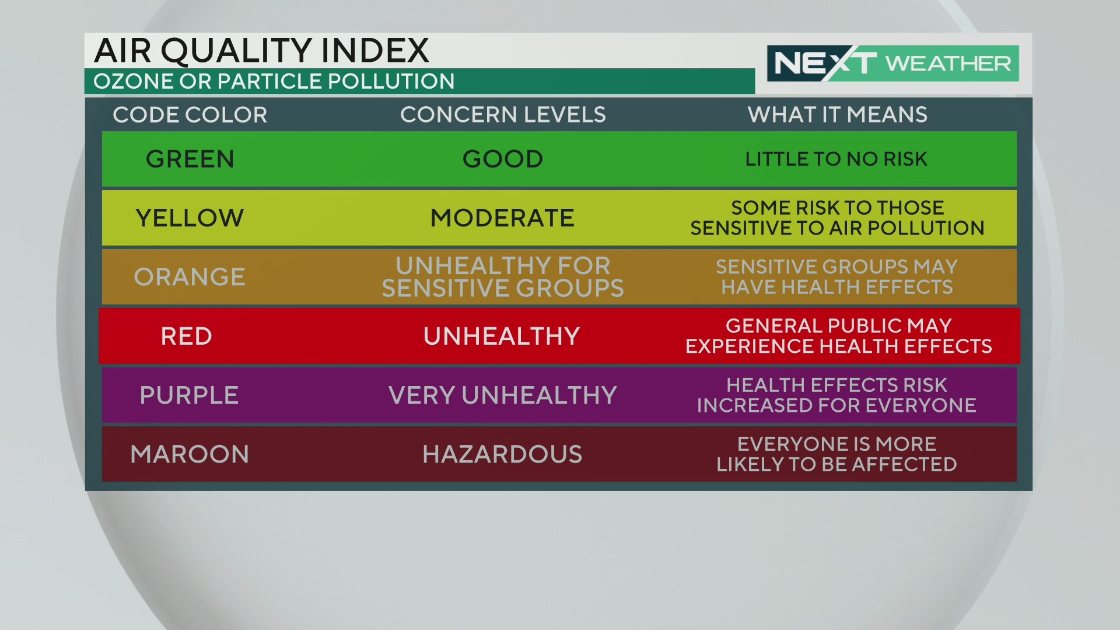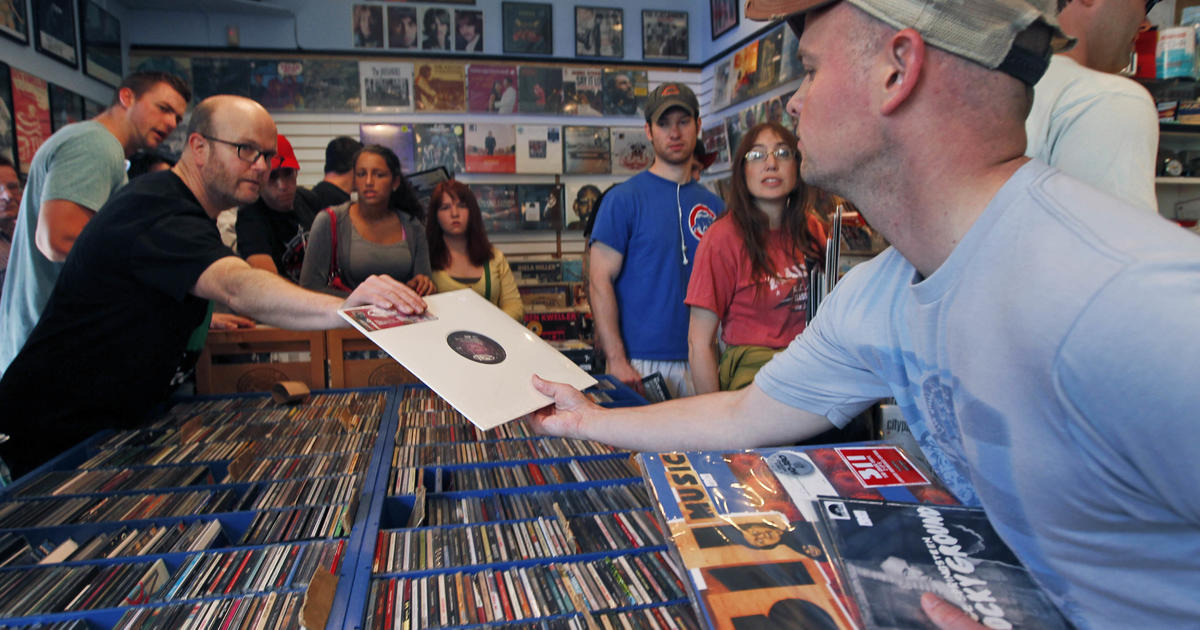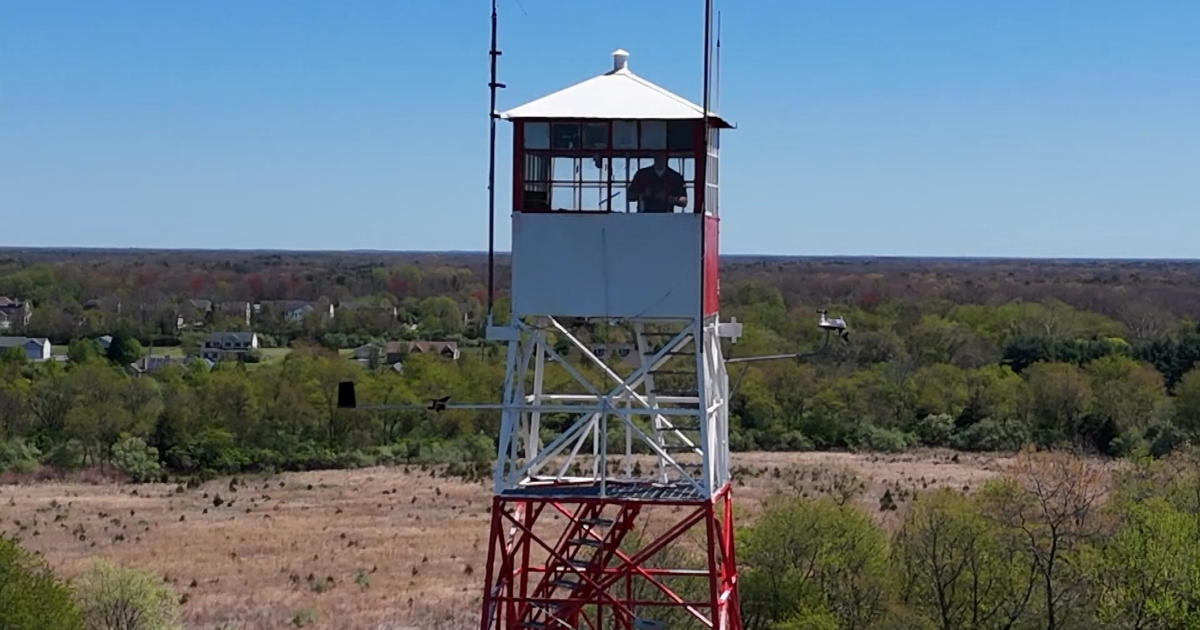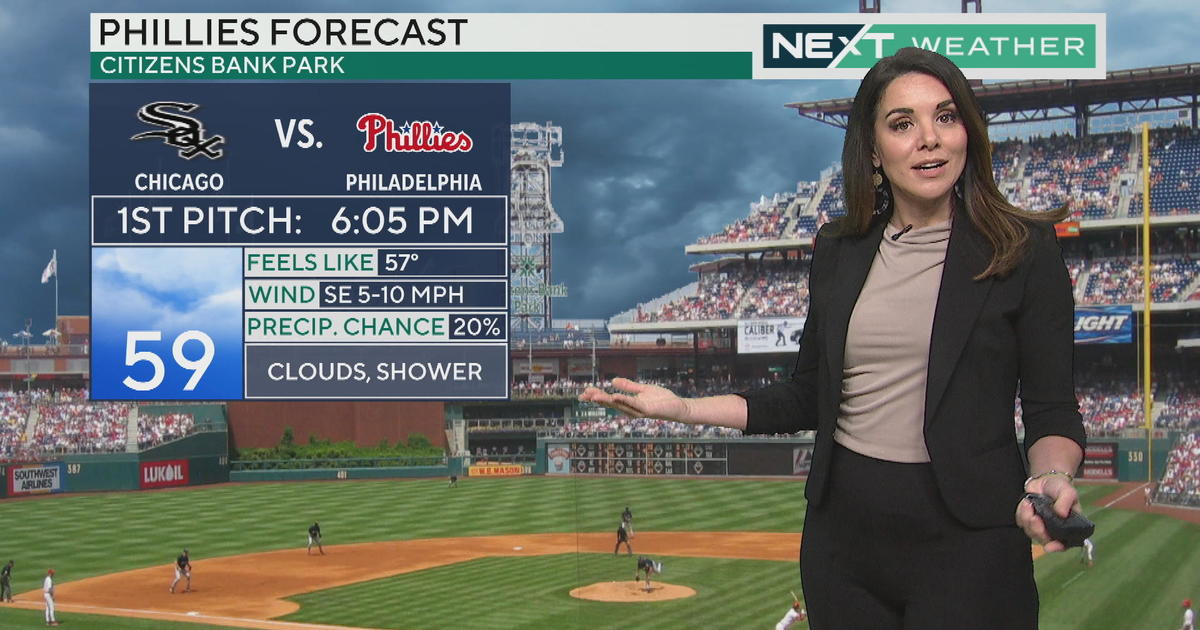What does "Code Red" air quality mean? Health effects of wildfire smoke and how to protect yourself
PHILADELPHIA (CBS) -- Most of the Philadelphia region is under the most hazardous air quality category Wednesday due to tiny particulate matter in the air as smoke from multiple wildfires in eastern Canada drifts down into our region.
Parts of the area are under "Code Maroon," "Code Purple," or "Code Red" air quality alerts.
A "Code Red" is based on the U.S. Air Quality Index (AQI), which reports air quality. The higher the AQI value, the greater the level of air pollution and the greater the health concern, according to AirNow.
What is a "Code Red" air quality alert?
An AQI "Code Red Fine Particles Action Day" is declared when the value index is between 151 to 200, meaning the air is unhealthy to breathe, according to AirNow. This means members of sensitive groups or those with compromised immune systems — such as the elderly, young children and pregnant women — may experience more serious health effects.
What does "Purple" air quality mean?
If conditions worsen, then air quality alert could be upgraded to a "Code Purple" in some areas, which means pollution in the air is "very unhealthy" and the risks of health effects increase for everyone. The air quality will be upgraded if the index rises above 201.
Click here to find the AQI near you
What is a "Code Maroon" air quality alert?
A "Code Maroon" air quality alert is the worst air quality alert based on the AQI. It means the value of index is 301 or higher, and everyone is more likely to be affected by the particles in the air.
Health effects of wildfire smoke:
The smoke has blanketed our region from the Lehigh Valley to Philadelphia, the Jersey Shore and Delaware.
Wildfire smoke is particularly dangerous and can make you sick because it contains tiny particulate matter, or PM2.5 – which are the finest of pollutants, about one-thirtieth the width of a strand of human hair.
Doctors say the wildfire smoke contains hazardous particles that can include carbon monoxide, carbon dioxide and various chemicals.
When inhaled, PM 2.5 can travel deep into lung tissue and enter the bloodstream. It comes from sources like the combustion of fossil fuels, dust storms and wildfires, and has been linked to several health complications including asthma, heart disease and other respiratory illnesses.
"When you have this very, very fine particular matter, it can get down deep into the lung tissue below that level and it becomes very difficult for the lungs to clean themselves," Philadelphia Health Commissioner Dr. Cheryl Bettigole said. "We tend to have more synonyms related to that exposure. This is considered very hazardous for people with lung conditions, but even the general population can experience synonyms for this kind of event."
Wildfire smoke can also cause your eyes to burn and your nose to run, according to health officials.
And the impacts could be deadly: In 2016, about 4.2 million premature deaths were associated with fine particulate matter, according to the World Health Organization.
Despite the possible negative impacts from the smoke, some people in South Jersey still went out to dinner outside.
Elsewhere in the region, the haze didn't stop families from celebrating their graduates Wednesday night at the Abington Senior High School graduation.
Though the ceremony was outside, the school did offer an inside viewing area.
Is it safe to go outside?
Health officials say to pay attention to your body. If you're having trouble breathing, feel nauseous or dizzy, you should seek medical attention as soon as possible.
"It's equivalent, depending on how long you're outside, smoking somewhere between three and 11 cigarettes a day," said Dr. George Martin, an asthma specialist at Main Line Health. "Just by breathing this air in because of all the pollution."
Additionally, you may not feel the impacts of smoke right away - the effects of exercising in smoky conditions may show up later.
"If you can see or smell smoke, know that you're being exposed," said William Barrett, the national senior director of clean air advocacy with the American Lung Association. "And it's important that you do everything you can to remain indoors during those high, high pollution episodes, and it's really important to keep an eye on your health or any development of symptoms."
Air quality and health:
Exposure to air pollutants, such as particulate matter and ground-level ozone can cause a variety of symptoms and can aggravate health problems, according to the CDC.
- Coughing
- Trouble breathing normally
- Stinging eyes
- A scratchy throat
- Runny nose
- Irritated sinuses
- Wheezing and shortness of breath
- Chest pain
- Headaches
- An asthma attack
- Tiredness
- Fast heartbeat
An expectorant, like Mucinex, or honey can be helpful at minimizing a cough, doctors say. If your eyes are irritated, doctors suggest using a saline solution.
What to do during air quality alert:
The best thing to do to protect yourself? Stay inside and take other precautionary steps to limit your exposure, experts say.
"The particulate matter that's in this haze is significant because it does irritate the bronchioles, or the small tubes that go down into your lungs and connect to the alveoli, which are the sacs that allow you to breathe," Dr. Bob Lahita, director of the Institute for Autoimmune and Rheumatic Disease at St. Joseph's Health, told CBS News. "That gets irritated in people without asthma, but if you have asthma, chronic obstructive pulmonary disease, congestive heart failure or anything that involves your lungs or even your heart, you should stay indoors."
During a "Code Red" AQI alert, it is strongly recommended to cancel outdoor activities and gatherings. You should avoid going outside as much as possible, as well as limit outdoor activities, such as jogging and exercising, according to the Philadelphia Department of Public Health.
Keep your windows and doors closed, unless it is very hot outside, the CDC says. Run your air conditioning, if you have one, but keep the fresh-air intake closed and the filter clean. If you're driving, set your car's A/C to "recirculate" to avoid drawing in outside air.
Be sure not to add indoor pollutants, such as burning candles or fireplaces. It is also recommended to not vacuum, as vacuuming stirs up particles already inside your home.
Health officials also say to not smoke tobacco or other produce, as the smoke will add more pollution into the air.
Does a face mask help with air pollution?
Wearing a mask may help limit irritation from the wildfire smoke, according to the National Weather Service. If you have to go outdoors, health officials said you should wear a high-quality mask, like an N95 or KN95 mask.
Paper "comfort" or "dust" masks commonly found at hardware stores trap large particles, such as sawdust, but will not protect your lungs from smoke, according to the Environmental Protection Agency.
Should I be running my air conditioner?
Run your air conditioner, if you have one, the CDC says. While air conditioners do not purify your air, air filters do help filter out dust, pollen and other allergens. Make sure to keep the fresh-air intake closed and the filter clean.
Run the air conditioning on a recirculation setting to prevent any outside air coming in, said Dr. David Hill, a pulmonologist and a member of the American Lung Association's National Board of Directors. You can also recirculate the air in your car if you need to drive anywhere.
If you have a central A/C system, you can also install a high-efficiency filter, such as a MERV 12 or higher.
"That basic 1-inch filter, we describe it as like a chain-link fence. It's made to stop baseballs and basketballs, but unfortunately, bb's can fly right through that chain link fence," said Ryan Corbett with Dream Team HVAC. That's the same thing with a basic filter."
He says there are other items you can install – like electronic filters, UV bulbs, and air scrubbers that all add to the air quality in your home. However, those aren't the quickest installs, and while these kinds of air quality events aren't easy to predict – Corbett said it does present an opportunity for people to think ahead of their futures.
"Use this time to think about your air quality, think about your breathing, think about your lungs, and how you can make your home safer so your family is safer," he said.
It is also recommended that you shut the doors to laundry and bathrooms, as these spaces typically have ventilation ducts that lead outside.
"Changing your filters, making sure your doors are closed, your windows are closed, and not trying to get that outside air inside. You're, more or less, circulating the same air that's in your home, unfortunately," Corbett said.
Do air purifiers help with smoke?
Air purifiers do help with smoke by removing particles and odors. While not all air purifiers do a good job of removing smoke particulates, the most effective against smoke have a HEPA filter and a large fan to help force air through a fine mesh that trap particles, according to Consumer Reports. Air purifiers fitted with HEPA filters can reduce particle concentrations by as much as 85 percent, according to the EPA.
Click here to find the best air purifiers for wildfire smoke
Use a freestanding indoor air filter with particle removal, the CDC recommends. You should change the filter as soon as the indicator light comes on or in accordance with the time frame specified in the manual. If you are not able to change the filter right away, a dirty filter is still better than not using an air purifier at all, Consumer Report said.
"Make sure it is sized for the room and that it does not make ozone, which is a harmful air pollutant," AirNow says.
Hill told the Associated Press that people, especially those with underlying lung or heart disease, "should consider investing in air purifiers for their homes."
Is it safe to exercise with bad air quality?
Health officials advise against exercising or doing strenuous activities outside during a "Code Red," as bad air quality can lead to negative health effects, CBS News reported.
A 2021 study published in the European Heart Journal found that while physical activity is generally an important part of reducing the risk of cardiovascular diseases, in highly polluted air, it can do the opposite. The study, which looked at young adults exposed to particulate matter, found that those exposed to "high levels of PM2.5 or PM10, were at "an increased risk" of cardiovascular diseases. The study did note that higher-intensity exercises contributed to how much risk was posed.
Even moderate amounts of pollution, such as in cities with air quality index scores between 26-50, can impact your ability to breathe outdoors. At "unhealthy" levels and above – 101 AQI and above – outdoor exercise is no longer encouraged.
The best time to exercise outdoors is when your city's AQI is between 0 and 50, meaning the air quality is "satisfactory" and there is minimal risk of air pollution, experts say. Moderate AQI levels, from 51 to 100, are mostly acceptable, but the present pollution could pose a problem to those who have chronic health conditions or are more sensitive to pollution. The risk of health impacts only increases as AQI levels develop further.
If you choose to go against warnings and engage in exercise outside, the American Lung Association suggests finding areas that may have lower pollution areas, such as nature trails, and avoid the busiest traffic times of the day, when cars add the most particulate matter to the air.
The organization also suggests opting for lower-intensity workouts. Higher-intensity workouts, such as long runs or sprinting, increases the amount you need to breathe, so keeping that activity to a minimum will "decrease the amount of unhealthy air that is inhaled," the ALA said.
"Deciding to take a long walk instead of a short run is another way that you can still enjoy the outdoors and minimize the possible lung damage."
Pets and wildfire smoke
If possible, keep your pets inside and only go outside for necessary potty breaks, the Pennsylvania SPCA says.
When you do go outside, only go for short walks and limit them to five minutes, whenever possible. SPCA officials said enrichment, like kongs and snuffle mats, are good ways to occupy your dog while indoors.
Check out these tips from a local veterinarian to help protect your pets during air quality alerts.
Other ways to help reduce the amount of pollution in the city:
- Avoid unnecessary trips in the car
- Avoid idling
- Carpool when possible
- Avoid using gas-powered lawn and garden equipment
The alert is expected to remain throughout the week, as persistent winds blow down from the north.
The Philadelphia Health Department is continuously monitoring the air quality and will provide updates when they are available. For more information, you can sign up for ReadyPhiladelphia by texting ReadyPhila to 888-777, or by visiting http://phila.gov/ready.
CBS News and CNN contributed to this post.




